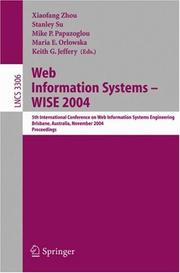| Listing 1 - 5 of 5 |
Sort by
|
Digital
ISBN: 9783540751199 Year: 2007 Publisher: Berlin, Heidelberg Springer-Verlag Berlin Heidelberg
Abstract | Keywords | Export | Availability | Bookmark
 Loading...
Loading...Choose an application
- Reference Manager
- EndNote
- RefWorks (Direct export to RefWorks)
Computer architecture. Operating systems --- Information systems --- Artificial intelligence. Robotics. Simulation. Graphics --- Computer. Automation --- ICT (informatie- en communicatietechnieken) --- informatica --- informatiesystemen --- database management --- KI (kunstmatige intelligentie) --- computernetwerken --- robots

ISBN: 9783540751182 3540751181 354075119X Year: 2007 Publisher: Berlin, Heidelberg : Springer Berlin Heidelberg : Imprint: Springer,
Abstract | Keywords | Export | Availability | Bookmark
 Loading...
Loading...Choose an application
- Reference Manager
- EndNote
- RefWorks (Direct export to RefWorks)
These are the proceedings of the 11th International Workshop on Cooperative Information Agents (CIA 2007), held at the Delft University of Technology, The Netherlands, September 19–21, 2007. In today’s world of ubiquitously connected heterogeneous information systems and computing devices, the intelligent coordination and provision of relevant added-value information at any time, anywhere is of key importance to a variety of applications. This challenge is envisioned to be coped with by means of appropriate intelligent and cooperative information agents. An information agent is a computational software entity that has access to one or multiple heterogeneous and geographically dispersed data and information sources. It pro-actively searches for and maintains information on behalf of its human users, or other agents preferably just in time. In other words, it is managing and overcoming the difficulties associated with information overload in open, pervasive information and service landscapes. Each component of a modern cooperative information system is represented by an appropriate intelligent information agent capable of resolving system and semantic heterogeneities in a given context on demand. Cooperative information agents are supposed to accomplish both individual and shared joint goals depending on the actual user preferences in line with given or deduced limits of time, budget and resources available. One major challenge of developing age- based intelligent information systems in open environments like the Internet and the Web is to balance the autonomy of networked data, information, and knowledge sources with the potential payoffs of leveraging them by the use of cooperative and intelligent information agents.
Intelligent agents (Computer software) --- Internet --- Agents intelligents (Logiciels) --- Congresses. --- Congrès --- Computer Science --- Mechanical Engineering - General --- Mechanical Engineering --- Engineering & Applied Sciences --- Information Technology --- Artificial Intelligence --- Computer science. --- Computer communication systems. --- Database management. --- Data mining. --- User interfaces (Computer systems). --- Artificial intelligence. --- Computer Science. --- Artificial Intelligence (incl. Robotics). --- Information Systems Applications (incl. Internet). --- Data Mining and Knowledge Discovery. --- Database Management. --- Computer Communication Networks. --- User Interfaces and Human Computer Interaction. --- AI (Artificial intelligence) --- Artificial thinking --- Electronic brains --- Intellectronics --- Intelligence, Artificial --- Intelligent machines --- Machine intelligence --- Thinking, Artificial --- Bionics --- Cognitive science --- Digital computer simulation --- Electronic data processing --- Logic machines --- Machine theory --- Self-organizing systems --- Simulation methods --- Fifth generation computers --- Neural computers --- Interfaces, User (Computer systems) --- Human-machine systems --- Human-computer interaction --- Algorithmic knowledge discovery --- Factual data analysis --- KDD (Information retrieval) --- Knowledge discovery in data --- Knowledge discovery in databases --- Mining, Data --- Database searching --- Data base management --- Data services (Database management) --- Database management services --- DBMS (Computer science) --- Generalized data management systems --- Services, Database management --- Systems, Database management --- Systems, Generalized database management --- Communication systems, Computer --- Computer communication systems --- Data networks, Computer --- ECNs (Electronic communication networks) --- Electronic communication networks --- Networks, Computer --- Teleprocessing networks --- Data transmission systems --- Digital communications --- Electronic systems --- Information networks --- Telecommunication --- Cyberinfrastructure --- Network computers --- Informatics --- Science --- Distributed processing --- Artificial Intelligence. --- Application software. --- Application computer programs --- Application computer software --- Applications software --- Apps (Computer software) --- Computer software
Book
ISBN: 9783642175992 9783642175985 9783642176005 Year: 2010 Publisher: Berlin Heidelberg Springer Berlin Heidelberg
Abstract | Keywords | Export | Availability | Bookmark
 Loading...
Loading...Choose an application
- Reference Manager
- EndNote
- RefWorks (Direct export to RefWorks)
S-Cube's Foundations for the Internet of Services Today's Internet is standing at a crossroads. The Internet has evolved from a source of information to a critical infrastructure which underpins our lives and economies. The demand for more multimedia content, more interconnected devices, more users, a richer user experience, services available any time and anywhere increases the pressure on existing networks and service platforms. The Internet needs a fundamental rearrangement to be ready to meet future needs. One of the areas of research for the Future Internet is the Internet of S- vices, a vision of the Internet where everything (e. g. , information, software, platforms and infrastructures) is available as a service. Services available on the Internet of Services can be used by anyone (if they are used according to the policies de?ned by the provider) and they can be extended with new services by anyone. Advantages of the Internet of Services include the p- sibility to build upon other people's e?orts and the little investment needed upfront to develop an application. The risk involved in pursuing new business ideas is diminished, and might lead to more innovative ideas being tried out in practice. It will lead to the appearance of new companies that are able to operate in niche areas, providing services to other companies that will be able to focus on their core business.
Logic --- Computer science --- Programming --- Computer architecture. Operating systems --- Information systems --- Artificial intelligence. Robotics. Simulation. Graphics --- Computer. Automation --- applicatiebeheer --- apps --- computers --- informatica --- programmeren (informatica) --- informatiesystemen --- software engineering --- KI (kunstmatige intelligentie) --- computernetwerken --- architectuur (informatica)
Book
ISBN: 9783540751199 Year: 2007 Publisher: Berlin Heidelberg Springer Berlin Heidelberg
Abstract | Keywords | Export | Availability | Bookmark
 Loading...
Loading...Choose an application
- Reference Manager
- EndNote
- RefWorks (Direct export to RefWorks)
These are the proceedings of the 11th International Workshop on Cooperative Information Agents (CIA 2007), held at the Delft University of Technology, The Netherlands, September 19-21, 2007. Intoday'sworldofubiquitouslyconnectedheterogeneousinformationsystems and computing devices, the intelligent coordination and provision of relevant added-value information at any time, anywhere is of key importance to a va- ety of applications. This challenge is envisioned to be coped with by means of appropriate intelligent and cooperative information agents. An information agent is a computational software entity that has access to one or multiple heterogeneous and geographically dispersed data and infor- tion sources. It pro-actively searches for and maintains information on behalf of its human users, or other agents preferably just in time. In other words, it is managing and overcoming the di?culties associated with information overload in open, pervasive information and service landscapes. Each component of a modern cooperative information system is represented by an appropriate intelligent information agent capable of resolving system and semantic heterogeneities in a given context on demand. Cooperative infor- tion agents are supposed to accomplish both individual and shared joint goals depending on the actual user preferences in line with given or deduced limits of time, budget and resources available. One major challenge of developing age- based intelligent information systems in open environments like the Internet and the Web is to balance the autonomy of networked data, information, and knowledge sources with the potential payo?s of leveraging them by the use of cooperative and intelligent information agents.
Computer architecture. Operating systems --- Information systems --- Artificial intelligence. Robotics. Simulation. Graphics --- Computer. Automation --- ICT (informatie- en communicatietechnieken) --- informatica --- informatiesystemen --- database management --- KI (kunstmatige intelligentie) --- computernetwerken --- robots


ISBN: 3540238948 3540304800 Year: 2004 Publisher: Berlin, Heidelberg : Springer Berlin Heidelberg : Imprint: Springer,
Abstract | Keywords | Export | Availability | Bookmark
 Loading...
Loading...Choose an application
- Reference Manager
- EndNote
- RefWorks (Direct export to RefWorks)
We have described the development of a new micro-payment system, NetPay, featuring different ways of managing electronic money, or e-coins. NetPay provides an off-line, anonymous protocol that supports high-volume, low-cost electronic transactions over the Internet. We developed three kinds of e-wallets to manage coins in a NetPay-based system: a sever-side e-wallet allowing multiple computer access to- coins; a client-side e-wallet allowing customer PC management of the e-coins, and a cookie-based e-wallet cache to improve performance of the client-side e-wallet communication overhead. Experiences to date with NetPay prototypes have demonstrated it provides an effective micro-payment strategy and customers welcome the ability to manage their electronic coins in different ways. References 1. Dai, X. and Lo, B.: NetPay – An Efficient Protocol for Micropayments on the WWW. Fifth Australian World Wide Web Conference, Australia (1999) 2. Dai, X., Grundy, J. and Lo, B.: Comparing and contrasting micro-payment models for- commerce systems, International Conferences of Info-tech and Info-net (ICII), China (2001) 3. Dai, X., Grundy, J.: Architecture of a Micro-Payment System for Thin-Client Web App- cations. In Proceedings of the 2002 International Conference on Internet Computing, Las Vegas, CSREA Press, June 24-27, 444--450 4. Dai, X. and Grundy J.: “Customer Perception of a Thin-client Micro-payment System Issues and Experiences”, Journal of End User Computing, 15(4), pp 62-77, (2003).
Popular Computer Science. --- Systems engineering --- Information storage and retrieval systems --- Web databases --- Computer science. --- Computer programming. --- Database management. --- Information storage and retrieval. --- Artificial intelligence. --- Computer Science. --- Programming Techniques. --- Information Systems Applications (incl. Internet). --- Database Management. --- Information Storage and Retrieval. --- Artificial Intelligence (incl. Robotics). --- AI (Artificial intelligence) --- Artificial thinking --- Electronic brains --- Intellectronics --- Intelligence, Artificial --- Intelligent machines --- Machine intelligence --- Thinking, Artificial --- Bionics --- Cognitive science --- Digital computer simulation --- Electronic data processing --- Logic machines --- Machine theory --- Self-organizing systems --- Simulation methods --- Fifth generation computers --- Neural computers --- Data base management --- Data services (Database management) --- Database management services --- DBMS (Computer science) --- Generalized data management systems --- Services, Database management --- Systems, Database management --- Systems, Generalized database management --- Computers --- Electronic computer programming --- Electronic digital computers --- Programming (Electronic computers) --- Coding theory --- Informatics --- Science --- Programming --- Information storage and retrieva. --- Artificial Intelligence. --- Information storage and retrieval systems. --- Automatic data storage --- Automatic information retrieval --- Automation in documentation --- Computer-based information systems --- Data processing systems --- Data storage and retrieval systems --- Discovery systems, Information --- Information discovery systems --- Information processing systems --- Information retrieval systems --- Machine data storage and retrieval --- Mechanized information storage and retrieval systems --- Computer systems --- Electronic information resources --- Data libraries --- Digital libraries --- Information organization --- Information retrieval --- Application software. --- Application computer programs --- Application computer software --- Applications software --- Apps (Computer software) --- Computer software
| Listing 1 - 5 of 5 |
Sort by
|

 Search
Search Feedback
Feedback About
About Help
Help News
News